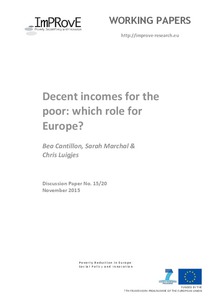Decent incomes for the poor: which role for Europe?
"Social Europe is under lingering construction. Not only does the EU indirectly (and increasingly) impact on national social policies, the Union itself is slowly evolving towards more social governance as has become apparent with the inclusion of social indicators in the European Semester. This...
| Main Authors: | , , , |
|---|---|
| Institution: | ETUI-European Trade Union Institute |
| Format: | TEXT |
| Language: | English |
| Published: |
Antwerp
2015
ImPRovE |
| Subjects: | |
| Online Access: | https://www.labourline.org/KENTIKA-19107801124919250839-Decent-incomes-for-the-poor-wh.htm |
| Summary: | "Social Europe is under lingering construction. Not only does the EU indirectly (and increasingly) impact on national social policies, the Union itself is slowly evolving towards more social governance as has become apparent with the inclusion of social indicators in the European Semester. This notwithstanding, apart from the coordination of social security rights for mobile workers, anti-discrimination legislation, and health and safety standards at work, social policy remains an exclusive national competence. Moreover, it is guaranteed to remain so through the legal subsidiarity principle. As a consequence, EU social policy has to a large extent been limited to soft governance initiatives that aim to influence national policies in order to achieve commonly agreed social goals. These goals are defined as social outcomes, rather than the means through which they are achieved, a governance model known as “second order output governance” (Vandenbroucke, Cantillon, Van Mechelen, Goedemé, & Van Lancker, 2013). However, over the past decades, despite the ambitious Lisbon and EU2020 social targets, many EU Member States have failed to make progress in fighting poverty. Since the crisis the picture has become truly negative, not in the least due to strong diverging trends within the Union. Meanwhile, the indirect influence of the EU on national social policies has increased. This begs the question whether a more performant EU level involvement in the field of social policy is conceivable, within the constraints set by the European Treaties. In this paper, we argue that European minimum standards are the place to start. Thereby, a broad approach should be taken, including principles for minimum social security and minimum wages. To this end we believe that time has come for a modest shift to “second order input governance”. More in particular, we propose to include policy indicators regarding minimum income protection sensu lato, in the recently revised EU monitoring process of the European Semester. We assess the current (im)balances in national minimum income packages, and discuss in depth the potential value of including the indicators in a structured EU monitoring, as well as their main drawbacks and limitations." |
|---|---|
| Physical Description: | 40 p. Digital |

